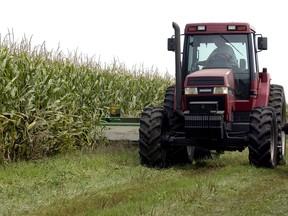Junk Science Week — Terence Corcoran: Weeds in the science - Financial Post
Canadian activists are using the courts to orchestrate a regulatory takeover — and a ban on a vital pesticide

Article content

Article content
For many years now environmental activists have been out to take down one of the most important and successful agricultural chemicals known to man. That chemical is glyphosate, also known as Roundup, a weed killer originally developed by Monsanto but now sold around the world by different corporations.
Advertisement 2
Article content
The green campaign to ban glyphosate is a global co-ordinated effort, but in Canada the war on the pesticide is led by an organization called Safe Food Matters, backed by the usual suspects: Environmental Defence, Friends of the Earth and the David Suzuki Foundation. The campaign is a well-funded effort involving millions of dollars over several years of legal proceedings.
The ban-glyphosate campaign is now before a Federal Court in Toronto. Since glyphosate products are constantly up for renewal, the new case is crucial for future policy, agriculture production, food prices and science. Use of the chemical keeps costs down and eliminates the need to plow and till fields, which research suggests reduces carbon emissions.
Advertisement 3
Article content
The activist objective is to force a radical transformation of Health Canada's regulatory regime from a government-controlled science operation into a new system that would transfer pesticide oversight to an outside panel — a panel that would be more open to the ideology-driven science manipulations favoured by activists. Such a power shift has occurred in other regulatory sectors, electricity being a recent example.
The latest move against glyphosate in Federal Court illustrates the activists' aggressive and sensational legal style. In an April 20 affidavit filed on behalf of the activists, the University of New Brunswick's Jason MacLean — self-described as a specialist in environmental and policy law who has appeared as an expert witness in U.S. glyphosate cases — laid out the two radical themes in the activist legal claims.
Article content
Advertisement 4
Article content
His first and main line of attack is regulatory: MacLean argues that Canada's regulator, the Pest Management Regulatory Agency (PMRA), has all the hallmarks of being a corrupt operation subject to "regulatory capture" by the pesticide industry. MacLean alleges that Monsanto and its successor, Bayer/Monsanto, have moved in on PMRA and created a regulator that acts in the best interests of corporations rather than the public interest. "PMRA embraces an industry-based approach to pesticide research."
Moreover, writes MacLean, the PMRA "appears to uncritically endorse and adopt" the views of another captured agency, the European Food Safety Authority (EFSA), which supports the EU regulatory conclusion that "classifying glyphosate as a carcinogenic, mutagenic or reprotoxic substance is not justified."
Advertisement 5
Article content
In the activist view, the EFSA is part of a global regulatory capture regime, from the U.S. Environmental Protection Agency (EPA) to regulators in Europe and Asia. In the United States the EPA's firm approval of glyphosate as safe and non-carcinogenic is under constant legal attack.
Allegations that Canada's PMRA is in the hands of industry come with little evidence. But lack of evidence has not stopped the activists. In its application asking the Federal Court to intervene against PMRA and force the appointment of an outside panel, Safe Food Matters claims a non-government panel is the only way to get objective outside scientific advice. Otherwise, it says, the government is depending on a regulator that could be home to "bureaucratic infirmity, lethargy, incapacity or inadequacy … including considerations of regulatory capture."
Advertisement 6
Article content
Smearing and slandering pesticide regulators is a standard activist tactic. Regulatory systems are never perfect; flaws are inevitable. But the claim that glyphosate regulation is controlled by corporations is malicious and unproven.
The PMRA's reports, however, aggressively defend its conclusions that glyphosate is safe, including a categorical 2019 dismissal of the activist attempt to overturn a 2017 approval decision. It documented the flaws in the activist approach to glyphosate health risks. The agency said it "left no stone unturned" in its review of the decision. After a thorough scientific review, "we have concluded that the concerns raised by the objectors could not be scientifically supported when considering the entire body of relevant data. The objections raised did not create doubt or concern regarding the scientific basis for the 2017 re-evaluation decision for glyphosate. Therefore, the Department's final decision will stand."
Advertisement 7
Article content
The second and related theme running through MacLean's affidavit and other court filings is that the PMRA — as a lethargic and infirm agency — is not guided by real science. When it comes to the science, however, it's the activists who are the most suspect.
When they first took their anti-PMRA arguments to Federal Court in 2019 asking for an independent review panel, Justice Sandra Simpson rejected the idea. She said she was simply "not persuaded that there were any studies which raised a scientifically well-founded doubt which would justify the appointment of a review panel."
Safe Foods then took the case to the Federal Court of Appeal, which supported the activists — up to a point. It sent the issue back to the PMRA for reconsideration. The appeal judges did not rule on the science, however. They said it is not up to the court to decide whether there is "scientifically founded doubt" regarding the safety of glyphosate.
Advertisement 8
Article content
A few months later, the PMRA sent the activists packing with a 33-page letter to Mary Lou McDonald, the CEO of Safe Foods, detailing the flaws in the activist approach to glyphosate risks. PMRA's chief registrar, Frédéric Bissonnette, said the agency rejected the idea of a review panel because the activists' science claim "does not raise scientifically founded doubt as to the validity of the evaluations … regarding the health risk assessment for glyphosate." Appointing outside experts, it said, would be of no help.
That's when Safe Foods and its associates launched the current legal case based on the regulatory capture claims that had not been raised during the first case. Given the flimsy foundation for the capture story, it is hard to imagine a federal judge in the new case will fall for the idea that the PMRA is a front for the glyphosate industry.
Advertisement 9
Article content
The appeal court judges in the first case concluded that it is not the role of the court to rule on scientific matters or to define what exactly is meant by the legal requirement that the PMRA follow a "scientifically based approach" to regulation. But where does that leave the courts? On what basis do they determine that the science as assessed by the PMRA is real and not junk corporate science — or whether the activists are the disseminators of junk science?
The body of research that contradicts the activist claims that glyphosate poses health and environmental risk is large and solid — certainly more solid than that mounted by the activists.
The range of glyphosate's risks is wide, but the headline grabber is that it causes cancer in humans. The carcinogenic claim received a big boost in 2015 when the United Nations' International Agency for Research on Cancer (IARC) produced a report claiming — with large qualifications — that there is "limited" evidence of carcinogenicity in humans for non-Hodgkin lymphoma and that glyphosate is therefore "probably" carcinogenic to humans.
Advertisement 10
Article content
Activists have been living off that study ever since, even though the junk science aspects of the cancer risks have been exposed and the conclusion rejected many times, as reported on this site back in 2017 and again in 2020. Not much has changed in the science.
In one of the better summary papers on glyphosate risks, a group of researchers in India observed in 2021 that since the 2015 IARC report "there are some studies that suggest cancer risk" due to direct exposure "while others do not." Direct exposure means contacting glyphosate up-close and directly on farms and in other industrial settings. Indirect exposure, including micro tracings in food, is not identified as a human health risk.
The science of glyphosate is unequivocally complex, which is the reason many researchers appropriately advocate continued research to identify true risks rather than promote outright bans based on unproven risks.
Advertisement 11
Article content
One of the most comprehensive and objective reviews of the science is a 2020 paper titled Controversies over human health and ecological impacts of glyphosate: Is it to be banned in modern agriculture? Published in the Environmental Pollution journal, the Australian paper argued against a ban and urged continued research (see excerpt below). "Based on the state-of the-art situation, it appears that glyphosate is a lesser toxic herbicide compared to several other weed killers if proper guidelines are followed," the researchers stated. To avoid controversies over the potential health risk of glyphosate in the soil ecosystem and to human health, the toxicity of glyphosate needs to be monitored and alternatives developed where necessary, they said.
Advertisement 12
Article content
-

Philip Cross: Why we can't trust traffic forecasts
-

Ross McKitrick: The Social Cost of Carbon game
-
Read the full Junk Science Week 2023 series
A similar sound approach to policy was reached by Mexican researchers in a 2022 paper — Overview of Environmental and Health Effects Related to Glyphosate Usage — in the journal Sustainability. "Further studies are needed on the side effects of glyphosate and GBHs on the environment, human health, and non-target organisms to fill in the gaps in the knowledge."
In the activist view, there are no gaps and Canada's regulator cannot be trusted. These claims are unfounded and a wise federal court judge should come to that conclusion.
• Email: tcorcoran@postmedia.com | Twitter:
Advertisement 13
Article content
Glyphosate needs constant study — not a ban
From the conclusion of "Controversies over human health and ecological impacts of glyphosate: Is it to be banned in modern agriculture?", a paper by Australian scientists published in the journal Environmental Pollution in March 2020.
"The formulations of glyphosate have been extensively used to control a wide array of weeds in the modern agricultural and nonagricultural settings worldwide. A perusal of the literature on toxicity of glyphosate particularly to humans indicates contrasting observations thereby drawing the attention of researchers to the growing concern in public health. On one hand, several reports suggest that glyphosate-based formulations are linked to the increased risk of cancer, endocrine disruption, celiac disease, autism, effect on erythrocytes, leaky gut syndrome and other disorders. … On the other hand, several other regulatory authorities and scientific bodies reported no significant relationship of glyphosate with any kind of cancer …
Advertisement 14
Article content
"Although glyphosate formulations have potential detrimental effects on beneficial terrestrial and aquatic microorganisms, several pathogenic microorganisms developed resistance to these commercial formulations … Based on the state-of the-art situation, it appears that glyphosate is a lesser toxic herbicide compared to several other weed killers if proper guidelines are followed during its application at judicious concentrations. However, the potential health risk of glyphosate in the soil ecosystem … needs to be clearly established. In order to avoid the controversies over the toxicity of glyphosate-based formulations to human health and other organisms of ecological importance, surfactants/adjuvants alternative to POEA should be developed."




Comments
Postmedia is committed to maintaining a lively but civil forum for discussion and encourage all readers to share their views on our articles. Comments may take up to an hour for moderation before appearing on the site. We ask you to keep your comments relevant and respectful. We have enabled email notifications—you will now receive an email if you receive a reply to your comment, there is an update to a comment thread you follow or if a user you follow comments. Visit our Community Guidelines for more information and details on how to adjust your email settings.
Join the Conversation